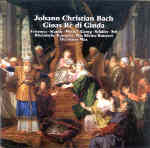This is J.C. Bach’s only oratorio, composed 10 years after Handel’s death in an effort to continue the tradition of Handel’s hybrid Italian opera/English oratorio style. It was a failure and soon disappeared. The libretto by Metastasio is based on the Old Testament usurper Queen Athalia’s attempt to keep the throne to herself, which she does by ordering the murder of all of her grandsons, thereby putting an end to the line of David. Of course, there’s a glitch: the wife of the high priest saves one of them (Gioas). After seven years of nasty idolatry, she and her Baal-loving priest, Matan, are overthrown and Gioas ascends. Metastasio adds other characters; Sebia, Gioas’ mother (who doesn’t know she’s his mother), Gioiada, who took in the boy when he was an infant, and Ismaele, a good guy who seems to find things out and bring news. The work is broken into two parts: in the first there are three choruses, seven arias, and a bunch of recitatives; in the second are four choruses, eight arias, a duet, recitatives, and some accompanied recitatives.
While nowhere near a masterpiece, the score contains some fine elements. The orchestration–strings, winds, horns, trumpets, timpani–is terrific, and the choruses, though brief, are varied and moving. I’m pretty certain that were the evil Athalia sung by an exciting mezzo with a real sense of drama, a good-sized voice, and a chest register (the role dips low enough)–say, Ewa Podles–this would have been far more engaging. As it is, the nice-voiced Mechthild Georg is tedious and she slurs her runs. Kai Wessel sings the lad Gioas, and his opaque countertenor is quite beautiful. He’s fluent in coloratura and he’s involved, although he rarely sings with any pressure on the tone, a pressure that would have been welcome.
Tom Sol sings Matan’s music well, particularly the vengeful, hateful aria in part two. Ulrike Staube’s pretty soprano is right for Sebia and tenor Markus Schäffer does what he can with Gioiada. Monika Frimmer’s Ismaele is okay. The stars are the superb chorus and Hermann Max’s Kleine Konzert. The latter plays its period instruments with élan and accuracy; it’s a pity the orchestra’s energy level can’t be picked up by the soloists. This is a curiosity, but fans of J.C. Bach will find plenty to enjoy despite a certain overall blandness.
































